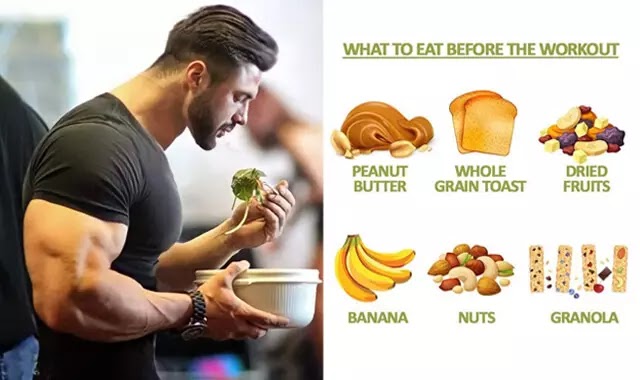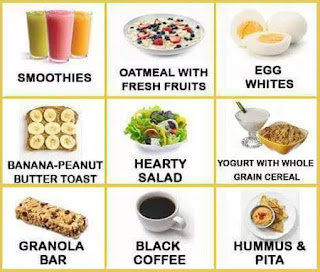For the majority of bodybuilders and athletes, not having a well-calibrated meal or snack before a workout or physical challenge is a sure step towards failure.
Indeed, the practice that follows this "faux pas" often turns out to be a waste of time and energy.
Pre-workout: What to Eat Before a Workout
Eat Properly!
Nutrition is one of the pillars of your progress, you know that you need to ensure optimal intakes of proteins, carbohydrates, and fats, whatever your goal.
Omitting this point, both in terms of quantity and quality, is only counterproductive, and leads you to regression in every way.
Therefore, you need to establish the best possible nutrition plan, including pre-workout, to maximize your energy, your progress, and your future gains!
Pre-workout diet
What we eat before (and after! (And even during!)) Training is above all determined by our personal preferences, our food tolerance, our sporting experience, and above all: by the nature and duration of the effort pursued.
When and what you eat before exercise will make a big difference to your performance and recovery.
A reminder of the main objectives of pre-workout nutrition:
Provide enough energy to propel you through your workout.
Start the recovery process much faster.
Improve your performance and athletic qualities (namely strength, endurance, mental focus, or power).
Positively affect your body composition (for example, aid recovery to build muscle or minimize muscle damage).
Hydration, which helps in faster recovery and better performance.
Macronutrients
There are 3 macronutrients to worry about at all times namely protein, carbohydrate, and fat. In the case of pre-workout nutrition, carbohydrates and protein are the two main things to focus on.
Lipids before exercise:
Certainly, while fat plays a major role in the body and your good health, its longer digestion time affects other foods as well. It’s not interesting right before a workout.
Slow digestion.
Maintains blood sugar and helps assimilate vitamins and minerals.
Does not appear to improve or decrease athletic performance.
Does not participate in fueling the effort (what we use carbohydrates for).
Carbohydrates before exercise:
This is the real fuel for your pre-workout strategy and your workout, even more so than protein.
A small reminder, glycogen is what feeds the muscles during efforts that can be described as endurance (in parallel with phosphocreatine and triglycerides) and come from the carbohydrates that you ingest.
However, the body relies heavily on carbohydrates to fuel muscles during exercise to maximize your performance.
Through a series of chemical reactions, carbohydrates are broken down into simple sugars via glycogen, resulting in usable energy: Glucose.
Stimulates the release of insulin, prevents protein degradation, against catabolism (which improves protein synthesis).
Help with the provision of fuel and help maintain effort.
Fuel your effort and can improve high-intensity training as well.
Preserves muscle and hepatic glycogen.
Carbohydrates: more exactly, the resulting glucose; are your body's preferred fuel source. This is why it is beneficial to eat the majority of your carbohydrates around your workout.
However, we do not recommend that you binge on rice or pasta, or even worse, candy, all day. We only tell you that you need it to fuel your body to train at your peak performance.
You want every gram of carbohydrate consumed to be used as an immediate fuel source or to restore your glycogen stores and help you recover physiologically and psychologically. Not that it is stored as fat.
Thus, you must be attentive to your needs, and at best distribute your carbohydrates evenly according to your efforts during a typical day.
For example, most range from around 40 grams of mid-absorption carbohydrate in the meal before strength training.
Protein before exercise:
Protein taken pre-workout does one thing, save muscle tissue from exertion and prevent muscle protein from being used as a source of energy.
Remember, you don't want to use YOUR protein for energy. You want your body to have optimal levels of amino acids (including Leucine and BCAAs) so that it does what it is supposed to do best: save, build, and repair muscle tissue.
Boosts muscle building.
Reduces muscle damage; (The less damage to your muscles, the faster you recover, and the better you adapt in the long run).
Help Maintain Muscle Mass So not only are you preventing damage, but you are promoting gains! ).
But before you rush into a powdered protein shake, know that any good quality source is fine.
Thus, any lean protein source up to 30g of BCAA-rich protein, taken before a workout is perfectly fine.
Individuality?
Remember, the nutrition around training is individual specific and there is no one type of scenario!
A quick example: endurance athletes have very different nutritional needs from an amateur bodybuilding practitioner or a weightlifting champion (strength/power sport).
However, in terms of the numbers for pre-workout nutrition, you can be provided with a set of sane, evidence-based guidelines for estimating a good approach.
Depending on what suits your individual needs, you can simply have a normal meal the few hours before exercise, or you can have a small meal just before your workout the 60 to 45 minutes before workout.
It probably goes without saying, but in your pre-workout diet choose foods that don't upset your gastric system. Otherwise, beware of unpleasant surprises ...
Recommendations for endurance efforts
The top macronutrients in this context are of course carbohydrates, to help replenish muscle glycogen, maintain endurance quality and energy during exercise.
2-4 hours before: preferably solid
Eat a balanced meal, composed of carbohydrates and proteins, from 0.1 to 0.2 g / kg in terms of carbohydrates and proteins, always according to your weight
Adding fat at this time is possible, just use it sparingly as long as it fits your macronutrient needs.
Types of carbohydrates:
It should be a mixture of medium and slow-acting carbohydrates. Try to stay away from simple sugars and high GIs.
30-60 minutes before: preferably liquid
Semi-liquid liquid carbohydrates to aid digestion, 0.1 to 0.2 g / kg of body weight for carbohydrates, and 0.1 g / Kg for proteins which are of less importance here.
Avoid lipids.
Think about liquids or gels
Endurance activities are typical efforts lasting at least 60 minutes. Due to the submaximal but prolonged nature of this type of effort, muscle glycogen is very very depleted.
Therefore, athletes need more or fewer carbohydrates to maintain energy levels, endurance and replenish muscle and liver glycogen stores.







.jpg)
0 Comments